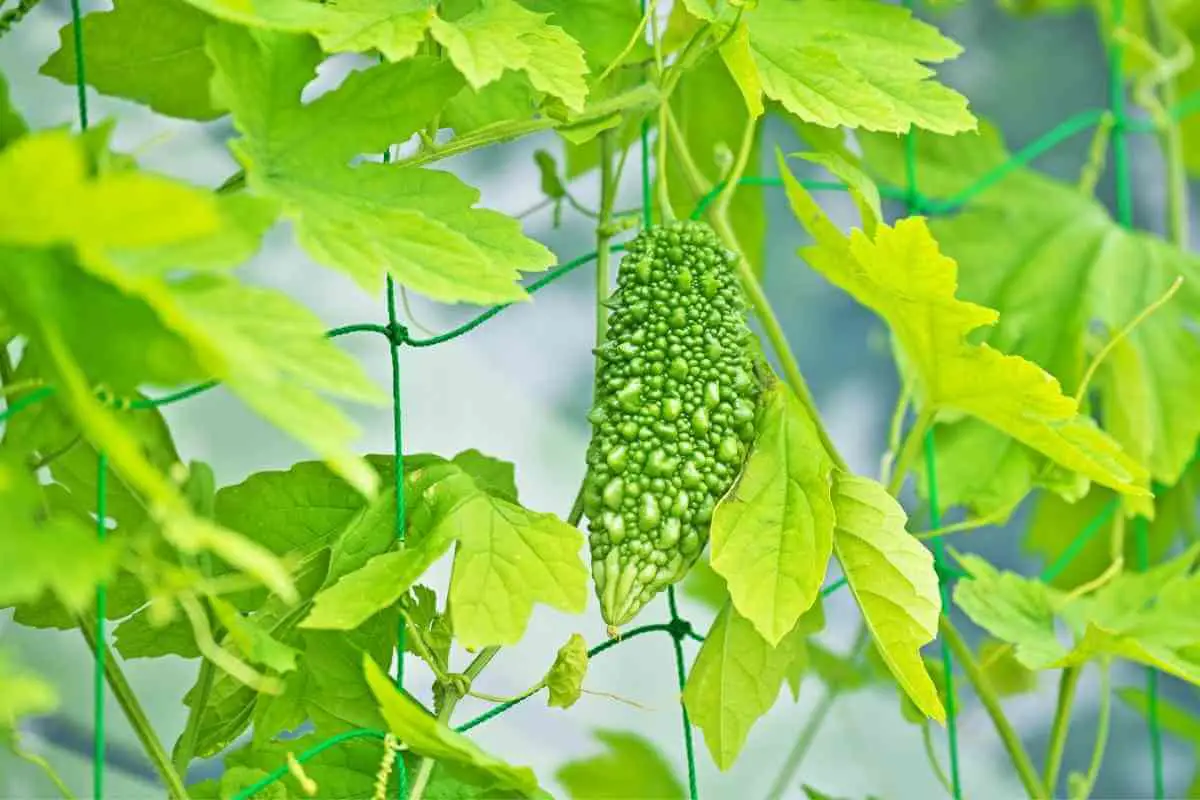Bitter gourd (karela) is a tropical vine vegetable plant widely grown in Asia.
This crop needs sandy loam soils with good drainage and a pH range of 6.5 to 7.5. It also requires fertilizers to increase flowers and fruits.
For optimum yield, use potassium-rich and phosphorus fertilizers and a smaller amount of nitrogen-rich. These fertilizers are also applied depending on the soil fertility and season of planting.
Fertilization Requirements for Bitter Gourds
Fertilizers are applied according to:
- the soil fertility
- variety
- weather
- and the period of a plantation
During land preparation, well-decomposed farmyard manure (FYM) is mixed with the soil.
The recommended fertilizer quantity per hectare is 50-100 kg N, 40-60 kg P2O5, and 30-60 kg 25 K2O.
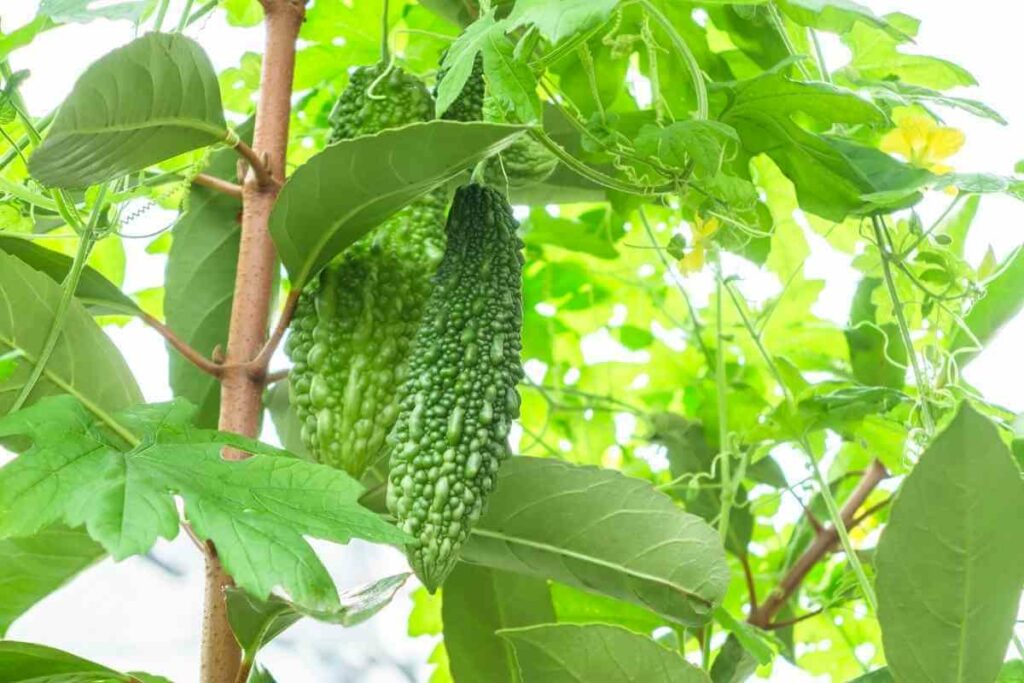
Before planting, you require half of the nitrogen and entire potassium and phosphorus. The rest of the nitrogen is added when the gourds have started flowering.
It is advisable to complete the application of all fertilizers before the fruit set.
Chemical Fertilizers That You Can Use for Bitter Gourds
Phosphate Fertilizers
Bitter gourds need fertilizers with a high yield of phosphorus to bear better and high-quality fruits.
Phosphates also help so much in root growth and increase the uptake of nutrients from the soil giving high-quality gourd fruits.
Before Planting: You need to add one-tenth pound of phosphorus per 100 square feet. Gourds need a ratio of 4-48-5 or 6-10-10.
Potassium Fertilizers
A large amount of potassium is needed for bitter gourds to yield more.
When planting, the soil should be fertilized with 91 grams of potassium per one hundred square feet.
Potash is always used in gardens as the source of potassium, and potassium nitrate is known to produce nitrogen and potassium magnesium sulfate, which also gives soil necessary magnesium.
Potassium promotes healthy stem and well-developed flowers, therefore yielding high-quality fruit.
Potash also helps the plant to use water and resist drought thus enhancing fruits.
Nitrogenous Fertilizers
Nitrogen helps in the rapid growth of the plants the healthy development of greenery and fruit.
This is the most important nutrient to the plant absorbed mostly than other elements.
However, nitrogen fertilizers shouldn’t be used too much on this plant because they will lower fruit production and improve greenery. The amount needed for nitrogen fertilizer dose should be 50-100 kg per hectare.
Advantages and Disadvantages of Chemical Fertilizers
Advantages
- They can be used in soils that are very infertile and improve it within a short time.
- Cheaper than organic fertilizers and easy to apply.
- They contain three essential nutrients (NPK) needed for plant growth.
- They are reliable and predictable.
- They have a sufficient amount of nutrients needed for the plant to grow.
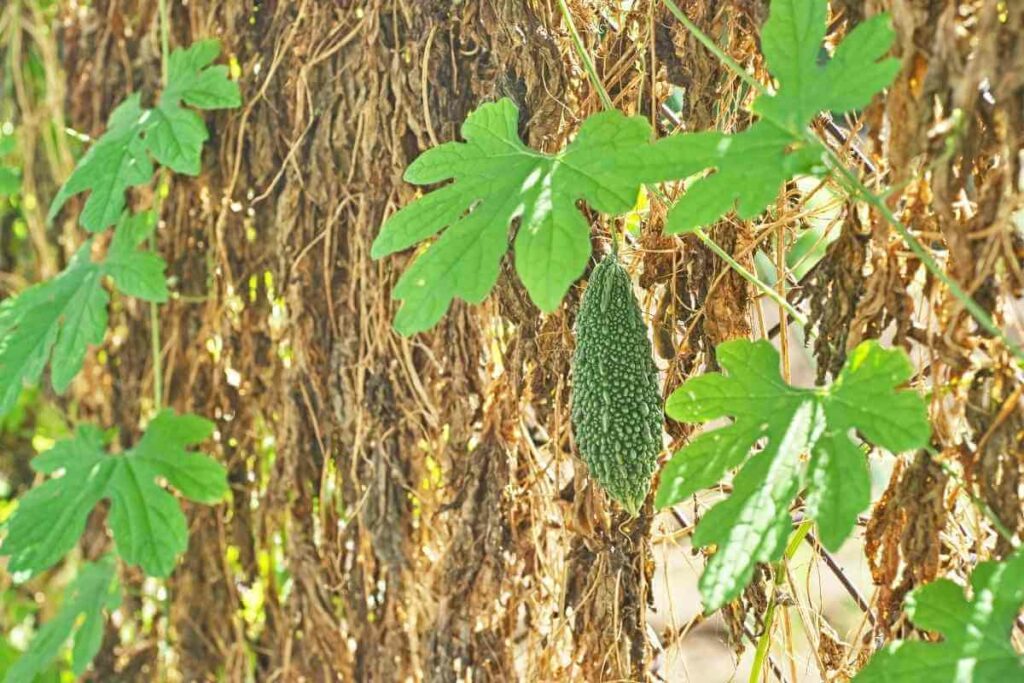
Disadvantages
- They cause soil and groundwater pollution. Chemical fertilizers are highly soluble in water and leach away into groundwater without much helping the plant.
- They have harmful elements which might leak to our food.
- Incorrect usage may do more harm than good.
- They usually harm microorganisms in the soil.
- When they are used for a long time, they damage the nutrients in the soil.
- Too much use of nitrogen contributes to the release of gases such as carbon dioxide and nitrous oxide into the atmosphere.
- They also encourage plant disease.
Best Organic Fertilizers for Bitter Gourds
Natural Organic Fertilizers for Bitter Gourds
Weed
Unwanted weeds from the garden have very high nutrients and will make one of the best fertilizers.
Weed tea will make a very good fertilizer that will help your plant to grow healthy.
What you need to do is to soak the weeds in water for several days, and when the water turns brownish like tea, pour it into your plants.
Kitchen Scraps
Compost releases nutrients very slowly, which may take you a year or even two without adding fertilizers to your plant.
These kitchen wastes also help the soil to keep moisture, which helps your plant during hot and dry summers.
Manure
This manure comes from various sources like chicken and other domestic animals.
Each type of these manures is very rich in nitrogen and other nutrients, but you should carefully use them.
Raw manure is always very acidic and contains high nutrients that your gourd may need.
It is always advisable to first dry your manure for several days before applying it to your plant.
Watch Out: Raw manure may even burn your plant if too much of it is applied.
Homemade Organic Fertilizers and How to Prepare
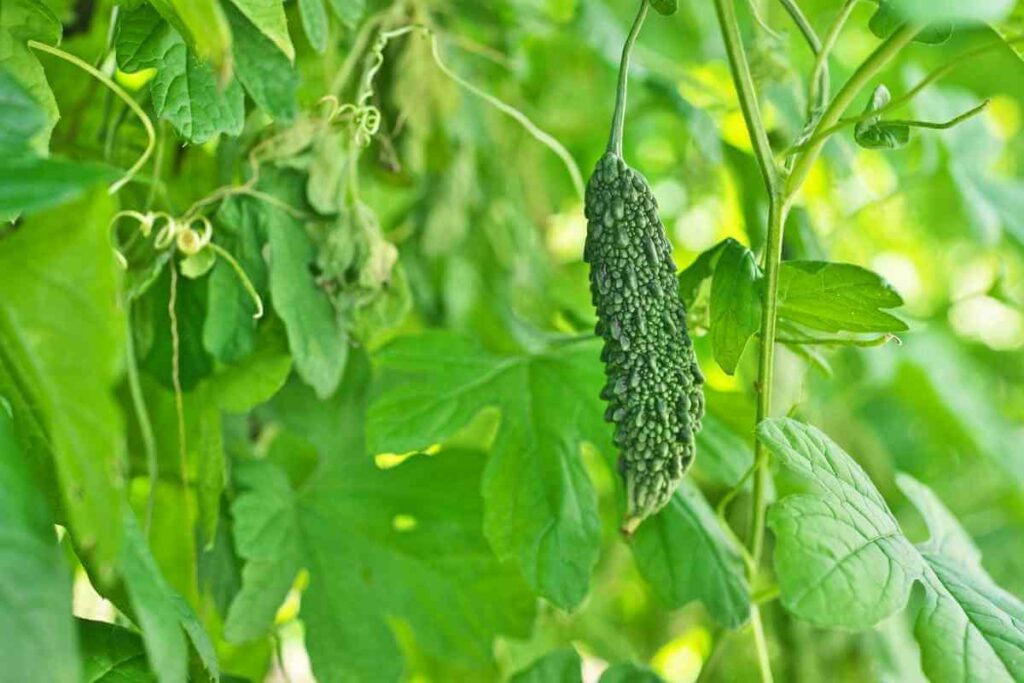
Tea Fertilizers
In a 5-gallon bucket, you mix:
- a ¼ cup of Epsom salts
- 2 cups of wood ash
- 2 cups of animal urine
You then add green leaves, grass, or weed pulled from the ground.
Fill the bucket with water and leave the mixture to steep for three to 5 days.
After steeping, you can drain your tea into empty jags or bottles, and before use, dilute it by mixing with 50% of water.
You can now apply the tea to the plant directly to the soil.
Fish Emulsion Fertilizers
Fish emulsion fertilizer is a type of fertilizer made by using fish waste like parts of the fish and water.
To prepare this fertilizer:
- Fill 55-gallon drum up to about a third, with half the ratio being fish waste and the other ratio being water.
- Leave it for 24 hours and add water to fill.
- Cover the drum for several weeks of up to 3 to 4 weeks.
Apply the emulsion fertilizer around your plant at the rate of 3 gallons for every 100 square feet of your garden.

Seaweed Fertilizer
Seaweed contains mannitol, a very good compound that increases the ability of the plant to absorb nutrients from the soil.
You can use fresh or dry seaweed but ensure they are properly washed before using.
Here is the process:
- You need about 10 cups of seaweed to a 5-gallon bucket; fill it halfway with water.
- Cover the bucket and let the seaweed steep for three weeks.
- Strain the complete seaweed and transfer the tea to another container.
- Store it and leave it for another three weeks.
To use the seaweed tea, mix half water with half of your seaweed and apply it around the plant directly to the soil.
What to Expect: This will give very good results after a few days.
Advantages and Disadvantages
Advantages of Using Organic Fertilizers
- Organic fertilizers improve soil texture- this fertilizer increases the texture of the soil and can hold water and have bacterial and fungal activity in the soil. They will not only improve your plant but even the health of the soil.
- Organic fertilizers are very safe – organic fertilizers are very safe to the environment since no chemicals are used at any point.
- Organic fertilizers are very easy to apply. These fertilizers must not be so stressful on the quantity you need to apply for each gourd. Whether you add them to the soil or spray the plant, they will never be harmful to the fruit.
- Reduce chemical fertilizers and pesticides needed. These fertilizers reduce the need to use pesticides and fertilizers like nitrogen, phosphorus, and potassium.
- They help to avoid plant damage like in the case of chemical fertilizers, which may cause damage to leaves and roots.
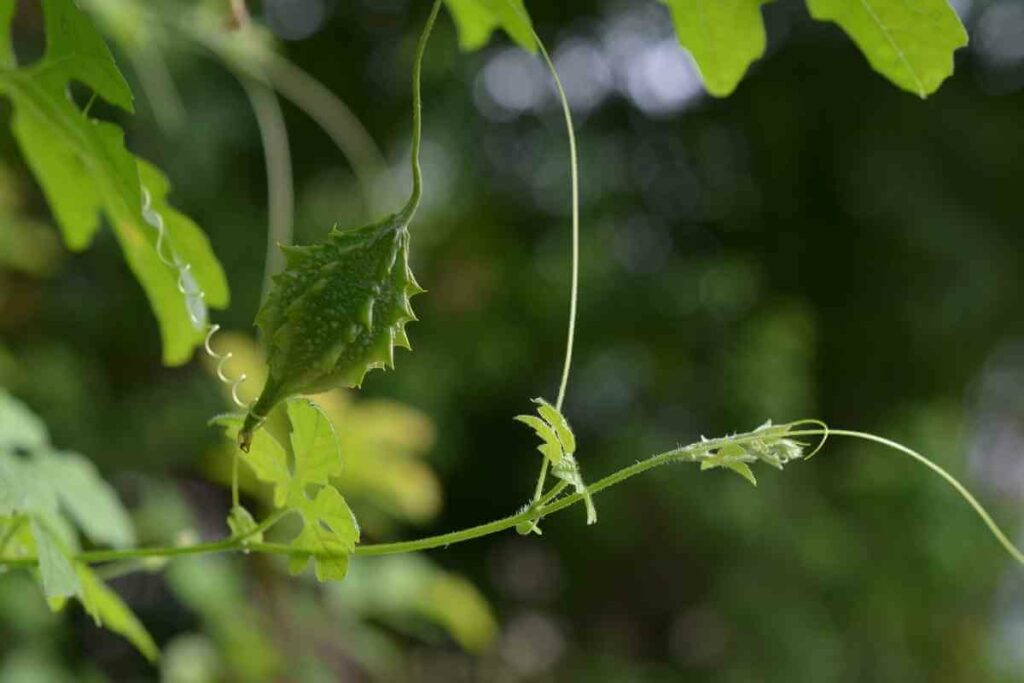
Disadvantages of Homemade Fertilizers for Bitter Gourds
- Produce is not created equally – not all products are equally created, and many organic products produce inconsistent results.
- Nutrients level is low – bitter gourds need potassium and phosphorus-rich fertilizers, and in the case of organic fertilizers, you have no idea of the quantity your fertilizer consists of. So using organic fertilizers may not produce the quality of good fruits as seen with chemical fertilizers.
- They are expensive per unit compared to chemical fertilizer.
- Organic fertilizers are also time-consuming to prepare and may even take a month.
Final Thoughts
Every plant including bitter gourds needs to be supplemented with fertilizers for maximum yields.
You can opt for either organic or chemical fertilizers.
However, it is always advisable to water your gourd plant after every application of the chemical fertilizers to dissolve them.
This helps the nutrients to be digested to where they are needed the most.
Again it is safer to use organic fertilizer than chemical fertilizers, although the yields may be lower.
